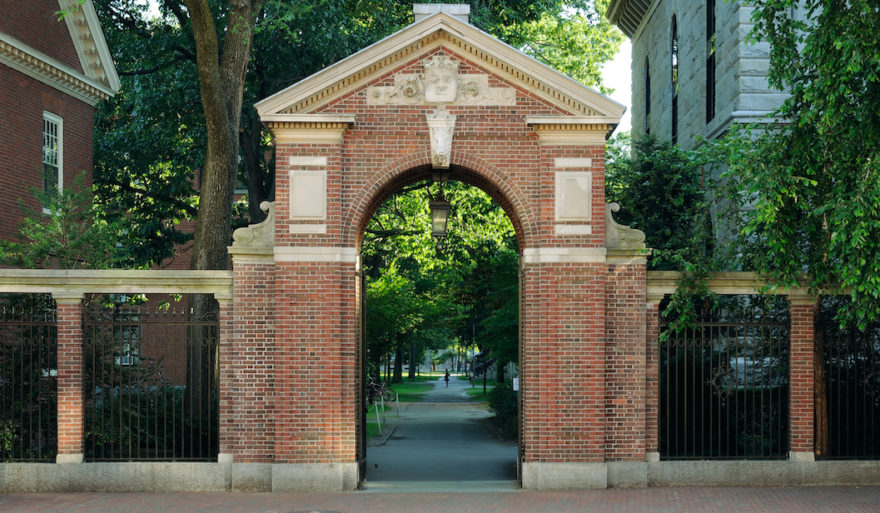- Blog
- > College Admissions
Harvard Acceptance Rate & Admission Requirements Guide
- Dr. Rachel Rubin
- | May 8, 2024

Harvard University is nestled in the heart of vibrant Cambridge, Massachusetts and it is the oldest and arguably most respected, well-known university in the United States. Harvard applicants hail from all over the world, seeking the profound social and academic enrichment of its extensive resources and prestige, close connections to the city of Boston, historic campus, and engaged, ambitious student body.
Is your SAT or ACT score high enough to get into Harvard? What about your high school GPA? The college admissions process at Ivy League schools seems hard to understand. How does Harvard choose whom to accept? What can you do to improve your chances? Raise your test scores. Do more extracurriculars? Apply early, which is called single-choice early action?
Below, we’ve condensed everything we know about the Harvard admissions process. Read on to find out if you’re a competitive applicant and tips to lift your chances of going from applicant to admitted student.
How Hard is it to get into Harvard University?
Getting into Harvard University is an immensely challenging endeavor, as it’s one of the world’s most prestigious and competitive colleges. The admissions process evaluates not only academic achievements but also extracurricular activities, proven leadership ability, and how compelling your narrative is in your application materials.
Working closely with one of Spark Admissions’ expert college admissions consultants offers students invaluable support by providing tailored guidance throughout every step of the college planning and application process. Our insider admissions knowledge and honed expertise help ensure that students showcase their strengths effectively and navigate the complexities of the admissions process successfully. Ultimately, students who work with Spark considerably increase their chances of gaining acceptance to Harvard.
Related Article: How To Get Into an Ivy League School
Harvard University Acceptance Rate
Harvard University’s reputation as a highly selective institution is well-earned. For the admitted Class of 2027, only 3% of applicants were admitted, meaning over 97% faced rejection. This percentage includes the slightly higher acceptance rate for early applicants through Harvard’s single-choice early action program. The regular decision acceptance rate, however, drops even lower, hovering around 2%.
As competition intensifies each year, with increasing numbers of students applying from across the globe, standing out among the crowd is more critical than ever. Although these figures might seem daunting, they shouldn’t discourage you.
By understanding Harvard’s priorities and aligning your application with what the school seeks, you can position yourself as a compelling candidate.
Harvard GPA Requirements
Your grade point average (GPA) plays a significant role in Harvard’s admissions decisions, as it reflects your academic performance and is derived from your high school transcript submitted with your application.
Maintaining an exceptional unweighted GPA is essential, particularly if you’re enrolled in advanced courses such as AP, IB, or honors classes offered at your school. Unlike weighted GPAs—which vary widely between schools and can sometimes obscure true academic performance—an unweighted GPA offers a clear picture of your academic consistency. For Harvard, this means accepted students must achieve nearly perfect grades (close to a 4.0 GPA) across all subjects while tackling the most challenging courses available to them.
Spark Admissions has the highest college admissions success rate in the country
Schedule A Free Consultation with an Admissions Expert
Schedule NowCollege Testing Requirements Specific to Harvard
Based on our experience consulting for Harvard hopefuls, Harvard generally expects applicants to submit standardized test scores, either the SAT or ACT, as part of their application. Although Harvard has adopted a test-optional policy in recent years, submitting strong test scores can give you a significant advantage. Since there’s no preference between the two exams, it’s best to choose the one that aligns better with your strengths, prepare extensively, and consider retaking the test to improve your results.
It’s worth noting that Harvard superscores on the SAT, meaning they’ll combine your best section scores from multiple test dates to create the highest possible composite. However, for the ACT, Harvard only considers the composite score from a single test date.
For most applicants, particularly those without special advantages such as legacy status or athletic recruitment, aiming for a score near the upper end of Harvard’s typical range can greatly improve your chances of being admitted.
Harvard SAT Requirements
The range of SAT scores for students admitted to Harvard varies. The table below shows the 25th through 75th percentile SAT scores, with the average Harvard SAT score at 1530. Learn what makes a good SAT score for Ivy League admissions.
| Test | Average Admitted Student Score Ranges | Average Score of Admitted Student |
| SAT Total Range | 1480-1580 | 1530 |
Harvard ACT Requirements
The range of ACT scores for students admitted to Harvard varies. The table below shows the 25th through 75th percentile ACT scores, with the average Harvard SAT score being 35.
| Test | Average Admitted Student Score Ranges | Average Score of Admitted Student |
| ACT Composite Range | 33-36 | 35 |
Note: Harvard University superscores the SAT, and Harvard does not superscore the ACT. This means that Harvard will mix and match section test scores from different days for the SAT, but only look at composite ACT scores from a single test date.
Additional Harvard Application Components
While academic excellence is crucial for admission to Harvard, the admissions process involves more than just grades and test scores. Harvard’s admissions team also considers the broader aspects of your life and achievements. Alongside your academic records, your application must include several essential components:
- Two recommendation letters from teachers and one from your school counselor
- Your official high school transcript
- A mid-year academic report
- The $75 application fee or a fee waiver if eligible
- A completed Common Application form
- Thoughtful responses to Harvard-specific essay prompts
Letters of Recommendation
Harvard seeks to understand the person behind the grades and test scores, which is why they require recommendation letters from two teachers and your school counselor. Instead of selecting the teachers from whom you earned the highest grades, focus on those who can speak to your character, work ethic, and unique contributions in your classroom.
Additionally, Harvard offers the option to submit letters from Additional Recommenders. This is an excellent chance to highlight qualities such as leadership, resilience, or your impact in extracurricular settings. These letters help paint a fuller picture of your personality and values, emphasizing who you are beyond your academic achievements.
Counselor Recommendation & School Documents
In addition to your transcript and counselor recommendation, your school counselor will provide a few important documents to support your application. One of these is a school report, which offers details about your high school, such as its demographic profile and unique policies, like limits on AP course enrollment. Another is a mid-year report, which updates Harvard on your progress during senior year, especially if final grades weren’t available when you applied.
These materials help Harvard understand your academic performance in the broader context of your school’s environment and opportunities.
The Common Application & Essay
To apply to Harvard, you’ll use the Common Application (or Coalition Application), a platform that simplifies the process of applying to multiple schools, including Ivy League institutions like Yale, Brown, and Princeton. This application collects standard information such as your demographics, educational background, and extracurricular activities. The activities section is particularly significant, as it highlights your accomplishments and interests outside the classroom, helping to set you apart from other applicants with similar academic credentials.
In addition to these details, the Common App requires a personal essay of up to 650 words, which will be sent to all the colleges on your list. This essay is a valuable opportunity to share a meaningful story or theme from your life, giving schools like Harvard insight into your personality and experiences. A compelling, well-crafted essay can greatly strengthen your application, so take the time to refine it through multiple drafts.
Supplemental Essays
Finally, Harvard, along with many other universities, requires supplemental essays tailored specifically to their institution. These essays are a critical part of your application, offering a chance to demonstrate why Harvard is the perfect place for you and how you can enrich its community. They also give you an opportunity to delve deeper into your accomplishments and interests.
While the prompts can vary each year, they typically focus on your connection to the school and your experiences. For example, previous Harvard essay prompts have included questions like:
- Elaborate on a significant extracurricular activity or work experience.
- Share something you’d want your future college roommate to know about you.
- Explain how you would contribute to Harvard’s mission of fostering citizen-leaders for society.
Crafting thoughtful responses to these essays requires a well-planned approach that ties your experiences and aspirations to the values of Harvard. Developing a clear and compelling narrative across these essays is essential for standing out at highly selective schools like Harvard.
Application Fee
The application fee to apply to Harvard is $75 online. However, if you show financial hardship, these fees can be waived.
Application Deadlines
As you put together all these materials, keep in mind the eventual deadlines! Everything for Harvard must be submitted by:
• November 1 for Single-Choice Early Action
• January 2 for Regular Decision
Single-Choice Early Action decisions are released in mid-December, and Regular Decision applicants will hear online by April. Admitted students must decide by May 1 if they will attend.
Demographics of Admitted Students at Harvard
Harvard University admits students from all over the country and from diverse backgrounds. According to The Harvard Crimson, the demographic breakdown of enrolled students into the Harvard Class of 2027 was:
- 50% men, 50% women
- 29.9 % Asian American
- 15.3% African-American/Black
- 11.3% Latinx
- 2.7% Native American/Pacific Islander
- 20%% first-generation students
How will the Supreme Court Decision Ending Affirmative Action Affect College Admissions at Harvard?
On June 29, 2023, the Supreme Court ruled against Harvard that it is illegal to use affirmative action in college admissions. This specifically goes against Harvard and other elite universities’ desires to make their student bodies more diverse and to provide opportunities for social advancement to African American, Hispanic, and Native-American populations, which have historically been underrepresented on college campuses. While the exact impact of this court decision is unknown, we anticipate that colleges like Harvard will use other measures, such as zip code, income level, and information conveyed in college essays, to keep their campuses as diverse as possible. That said, we all await to see how the Supreme Court decision will affect diversity at schools like Harvard.
Start Your Application to Harvard
Harvard’s admissions process is extremely competitive, so even the most qualified applicants should consider applying to other top-tier schools, such as Yale, Princeton, and Columbia, to maximize their options.
Best of luck with your applications! If you need guidance on any part of the process—whether it’s understanding your GPA, deciding when to take the SAT or ACT, choosing impactful extracurriculars, planning your summer activities, or brainstorming ideas for your essays—don’t hesitate to reach out. Our admissions consultants are here to help you every step of the way.


